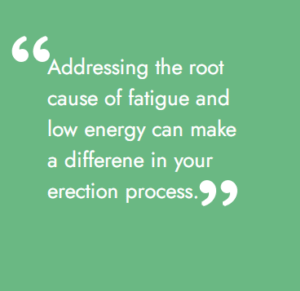
Erectile dysfunction is a common condition. It is likely that as many as 1 in 4 men under forty will have to deal with it. The number of men with erectile dysfunction rises steadily with age.
There is a high probability that a man will experience erection problems, or impotence, at some point in his life.
There is a growing trend of healthy, young men seeking treatment for erectile dysfunction. It is likely that even more cases go unreported and unaddressed.
With the growing awareness of erectile dysfunction today, it is vital that man have access to reliable information that helps them understand what causes erectile dysfunction.
How Erections Work
Typically, erections work when a stimulus triggers the body to increase blood flow to the penis. The stimulus is either visual, auditory, a thought, or some form of touch.
Arteries, which carry blood to the penis, dilate or expand, while the veins, which carry blood out of the penis do not. This allows blood to fill the penile tissue resulting in an erection.
If there is some basic level of stimulation throughout the process, a healthy man should maintain an erection until orgasm. Both the mind and the body must be working well in order to gain and maintain an erection. When one or both are not working well, erectile dysfunction can result.
What Causes Erectile Dysfunction?
 There are many medical conditions that can impact healthy blood flow to the penis or retention of blood in the penis. Generally, erectile dysfunction resulting from these conditions will respond well to medication or other medical interventions.
There are many medical conditions that can impact healthy blood flow to the penis or retention of blood in the penis. Generally, erectile dysfunction resulting from these conditions will respond well to medication or other medical interventions.
However, there is often more complexity to erectile dysfunction and the biological factors are often only a part of the reason why erectile dysfunction is happening.
Erections without the assistance of medication are possible and achievable. Many men with underlying medical conditions will report struggling with erections generally, but can achieve an erection with the use of pornography or when on vacation.
For these men, addressing the mind’s impact on erections can significantly help. This can be done in place of or in addition to medication and other physiological interventions.
For young and healthy men, the role of the mind in erections is far greater. For many men under the age of forty, erectile dysfunction will be psychogenic or primarily driven by mental factors such as performance anxiety and relationship distress.
For this population, curing ED without pills is not only possible, but also a treatment approach that addresses the root cause.
Erectile dysfunction is often caused by the mind. A lack of sufficient stimulation, either mental or physical, can be a primary factor.
Other conditions of the mind that impact erections include performance anxiety, depression, distractibility, insecurity, or relationship conflict. Oftentimes, once a man has experienced erectile dysfunction, the condition is maintained by the underlying worry, fear, and discomfort that it might happen again.
Physical Causes of Erectile Dysfunction
Physical issues contributing to erectile dysfunction need to be assessed by a physician. Any man experiencing erectile dysfunction should consult a physician as part of treatment.
There are several ways to categorize the physical causes of erectile dysfunction. For the purposes of this article, erectile dysfunction falls into three categories:
- Problems gaining an erection
- Problems maintaining an erection
- Problems with rigidity of erection
Problems gaining an erection are most often caused by a lack of adequate blood flow to the penis. There are many medical conditions that can impact blood flow to the penis. Oral medications help to increase blood flow and overcome this issue.
Problems maintaining an erection are often caused by a venous leak. This occurs when the veins do not properly prevent blood from leaving the penis and blood flows out too quickly leading to loss of erection.
 Problems with rigidity can result from inadequate blood flow to the penis and/or inadequate retention of blood in the penis.
Problems with rigidity can result from inadequate blood flow to the penis and/or inadequate retention of blood in the penis.
In addition to circulatory issues, problems with peripheral nerves, spinal injury, penile injury, Peyronie’s disease, cancers and endocrine issues can all be physical factors that cause erectile dysfunction.
All the above-mentioned conditions require medical intervention and/or management. Erectile dysfunction may be an early sign of medical conditions and should never be ignored.
Lifestyle Causes of ED
There are several lifestyle factors that can cause ED. Diet, weight, alcohol consumption, and smoking can negatively impact circulation and blood flow to the penis.
Pornography and masturbation are also commonly blamed for ED although the impact on erections and sexual function is complex.
Psychological Causes of ED
While erectile dysfunction is a medical condition, it often has a significant psychogenic component that contributes to, maintains, or even causes ED.
What Does Psychogenic Mean?
 Psychogenic means originating in the brain or psyche. This term generally refers to illnesses or medical conditions that are caused by emotional or mental stressors.
Psychogenic means originating in the brain or psyche. This term generally refers to illnesses or medical conditions that are caused by emotional or mental stressors.
However, erections and erectile dysfunction are more complex than other somatic medical issues and processes. Erections almost always require engagement of the mind, and certainly when a man wants to engage in sexual activity intentionally, the mind needs to be present.
For this reason, the role of the mind in erectile dysfunction is more vital than other medical conditions. Erections need your mind to be present and engaged. To what extent the mind needs to be present will vary for each man and will fluctuate based on situation and other factors.
Anything that takes away from the “pleasure and desire” components of sex can interfere with erections. A normal, healthy erection process requires an engaged mind.
Common Psychological ED Causes
Depression – It is normal to feel down and sad at times. However, when those feelings persist for longer periods of time, it can have a significant impact on erections.
Common symptoms of depression include the loss of pleasure in previously enjoyable activities, low self-esteem, fatigue, and feelings of isolation.
Anxiety – Everyone experiences anxiety at times, and it is a common feature of partnered sexual activity for many men. One of the hallmarks of anxiety is fast moving and uncontrollable thoughts. These thoughts often preclude a pleasurable experience by distraction and causing distress.
Anxiety is a common cause of erectile dysfunction. ED happens to most men at some point. After experiencing ED for the first time many men tend to worry about it happening again which leads to a self-fulfilling prophecy.
Distraction – The mind is the most complex part of the human body. People have many thoughts crossing their minds over the course of an hour. For some men, these thoughts can lead to distraction and detract from a sexual experience. Understanding the nature of the thoughts, what is causing them, and how to decrease the intensity and distractibility is important.
 Confidence – A man needs to feel good about himself when engaging in sexual activity.
Confidence – A man needs to feel good about himself when engaging in sexual activity.
If confidence is low, a man can become fixated with himself, not be able to experience pleasure and avoid sexual activities altogether.
Confidence issues can stem from body image and penis size concerns, performance anxiety, and fear about what a partner may be thinking.
Relationship ED Causes
Relationships are complex and issues stemming from insecure connection and conflict can directly impact sexual function and erectile dysfunction. Many men experience partner-based erectile dysfunction but have no ED issues when alone.
Some men also experience ED when with a specific partner but have good erections when with a different partner.
Other relationship causes of erectile dysfunction include fading attraction, communication issues, negative cycles that make the relationships uncomfortable, and an inability to discuss wants, needs and desires.
What Can You Do?
 Track your experiences. The details can make a big difference and accurate information is an important starting point. Be honest with yourself about what is happening. Be careful to not create a reason for the ED and then fit the experiences to that.
Track your experiences. The details can make a big difference and accurate information is an important starting point. Be honest with yourself about what is happening. Be careful to not create a reason for the ED and then fit the experiences to that.
Identify patterns. Often there are patterns as to when erectile dysfunction is occurring.
Those patterns may be important in focusing on the key factors that can be resolved or improved, leading to better erections.
Address mental health factors. Mental health can be a primary cause of erectile dysfunction. Anxiety, depression, and other life stressors can be mind-occupying, suppress pleasure and desire, and lead to relationship problems.
Make lifestyle changes. An unhealthy lifestyle can lead to problems with blood flow to the penis and can also have negative impacts on self-image. Losing weight, quitting smoking, and reducing alcohol use are among the changes that can help lead to better erections.
Focus on what you like. Pleasure is a key component in reliable erections. You have to like what you are doing! Too much focus on performance and other distractions can make otherwise enjoyable activities a stressful experience.
Talk to your partner. You may benefit from talking to your partner about the challenges you are having. It can seem easier and less vulnerable to take a pill, but this is a short-term solution that does not always address the underlying cause of your erection problems.
Talking with your partner can be powerful and impactful in ways far beyond resolving erectile dysfunction.
Ready to Learn More?
To start your in-depth approach to resolving ED, try our online learning course called BEYOND THE LITTLE BLUE PILL, The Thinking Man’s Guide to Understanding and Addressing ED.
Erection IQ founder Mark Goldberg helps men resolve erectile dysfunction. He offers individual, one-on-one services to men throughout the world through a secure, telehealth platform. It’s 100% confidential. You can visit his website — The Center for Intimacy, Connection and Change — to schedule a free consult.
Subscribe to our Podcast
Find all of our Erectile Dysfunction Radio Podcast episodes categorized by topic here, or find and subscribe to us for free on Apple Podcast/iTunes, Spotify and YouTube.
Article Updated – September 2021


